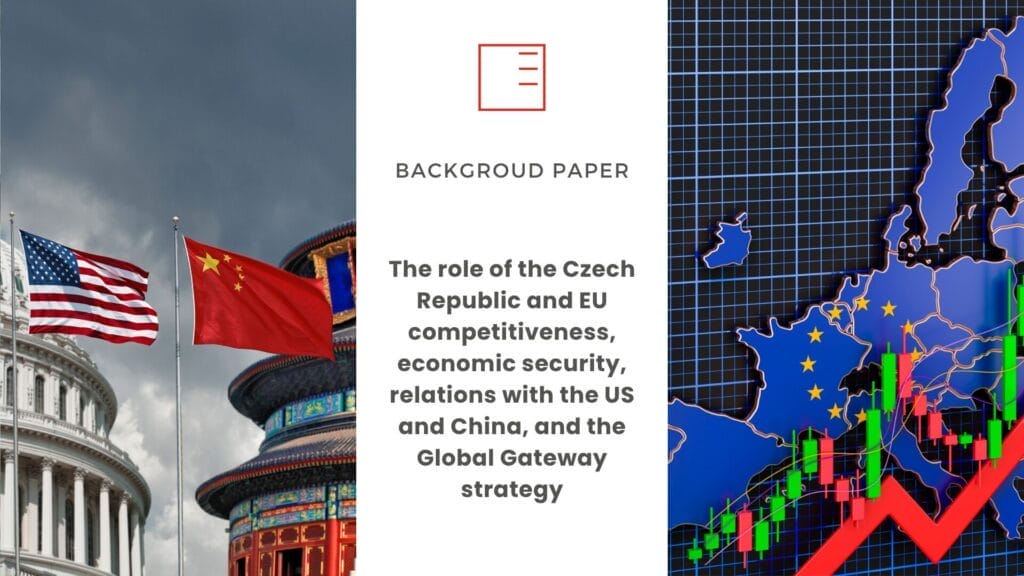
The role of the Czech Republic and EU competitiveness, economic security, relations with the US and China, and the Global Gateway strategy | Background paper of the National Convention on European Union
More info 21. 10. 2025
21. 10. 2025
Economic security and competitiveness are becoming key issues for the European Union in order to maintain its global position and internal stability. The EU faces a long-term lag behind the United States in innovation and technology, while pressure from China and other economic rivals is growing. A new wave of American protectionism, geopolitical upheavals caused by Russian aggression, and the experience of the COVID-19 pandemic have exposed the vulnerability of the European economy and its dependence on external supply chains. The European Commission has therefore presented a set of initiatives – from the Competitiveness Compass to the Clean Industry Agreement – aimed at strengthening resilience, reducing dependence on third countries, and streamlining the business environment. The Global Gateway initiative, which aims to diversify European trade and supply relations through strategic investments and partnerships, is also an important tool for strengthening the Union's global role. Given the strong industrial orientation and openness of the Czech economy, it is essential for Czechia to actively engage in these debates and formulate its priorities within the European economic security strategy.

Policy Paper | Czechia and the Priorities of the Next Multiannual Financial Framework 2028-2034
More info 23. 7. 2025
23. 7. 2025
On 16 July 2025, the European Commission presented its proposal for the next Multiannual Financial Framework (MFF) for the period 2028–2034, launching a process that will likely lead to lengthy negotiations between EU institutions and could last until the end of 2027. This policy paper by Filip Křenek (EUROPEUM) and Josef Bič (VŠE) analyses the discussions that preceded the proposal’s publication, highlights key elements expected in the upcoming MFF, and outlines the compromises policymakers will have to navigate during the negotiations. At the same time, the analysis offers specific recommendations for both Czech and European policymakers, taking into account the specific context of the Czech Republic as well as broader European dynamics.
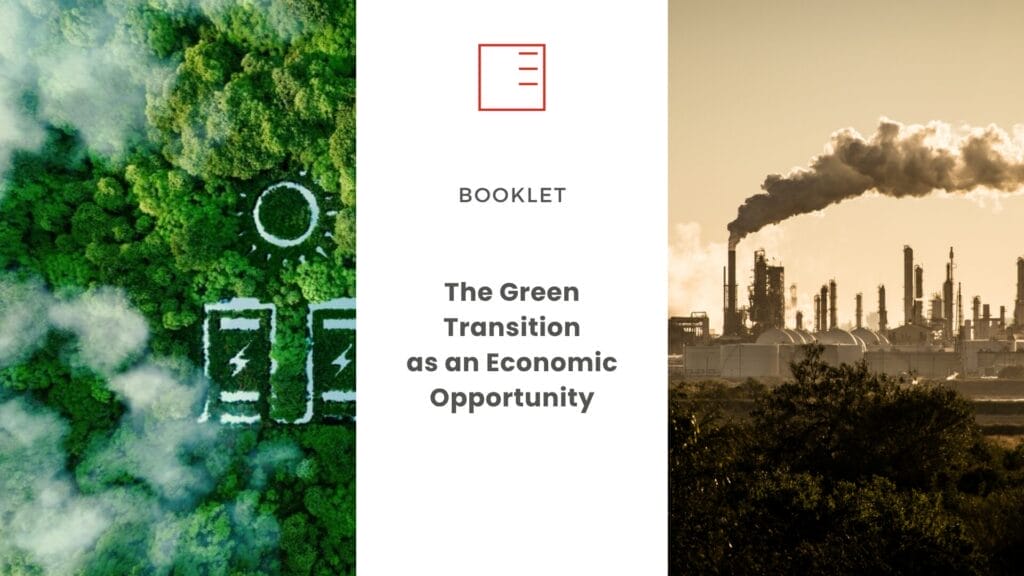
Booklet | The Green Transition as an Economic Opportunity
More info 3. 6. 2025
3. 6. 2025
Climate change is no longer an abstract threat in the future, but a reality that already has tangible impacts on our lives and the economy today. The rising costs of climate change are up to six times higher than the costs of mitigating it. For the Czech Republic, investment in the green transition could yield a return of up to 3.6 times—especially in the public budget and the energy sector. Moreover, the Czech Republic has access to the largest amount of European funding in its history to support this transformation
approximately CZK 1 trillion. This presents a unique opportunity to strengthen the economy, increase its resilience, and modernize it toward greater added value.
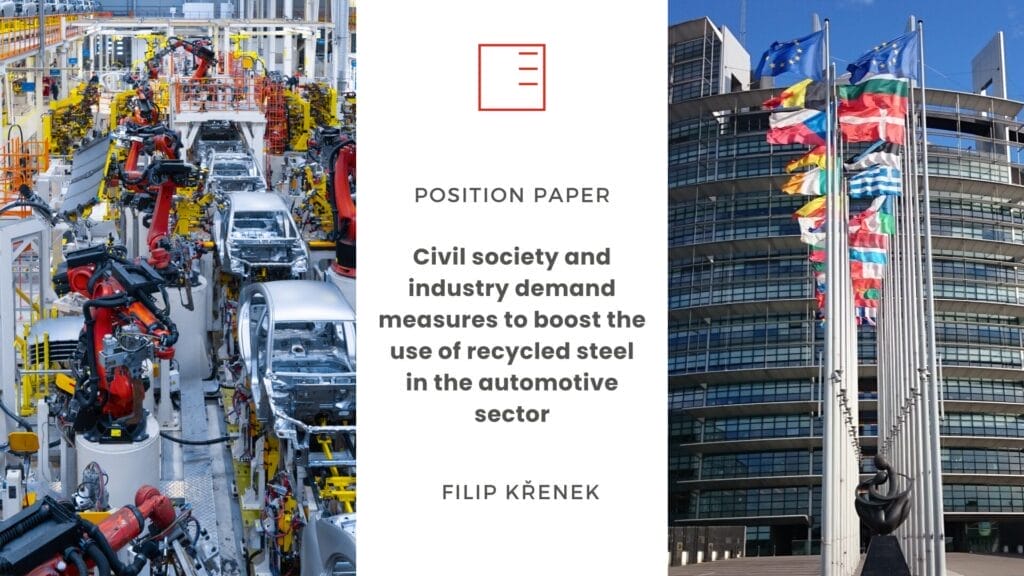
Position Paper | Civil society and industry demand measures to boost the use of recycled steel in the automotive sector
More info 21. 5. 2025
21. 5. 2025
The European automotive industry is undergoing a major transformation. As EU legislation on vehicle circularity is being updated, non-profit organisations, think tanks, and representatives of the recycling sector are calling on the European Parliament and the Council to set more ambitious targets for the use of recycled steel in car manufacturing.
The signatories of the joint statement are urging stronger measures to ensure that recycled steel becomes a standard component in automotive production.
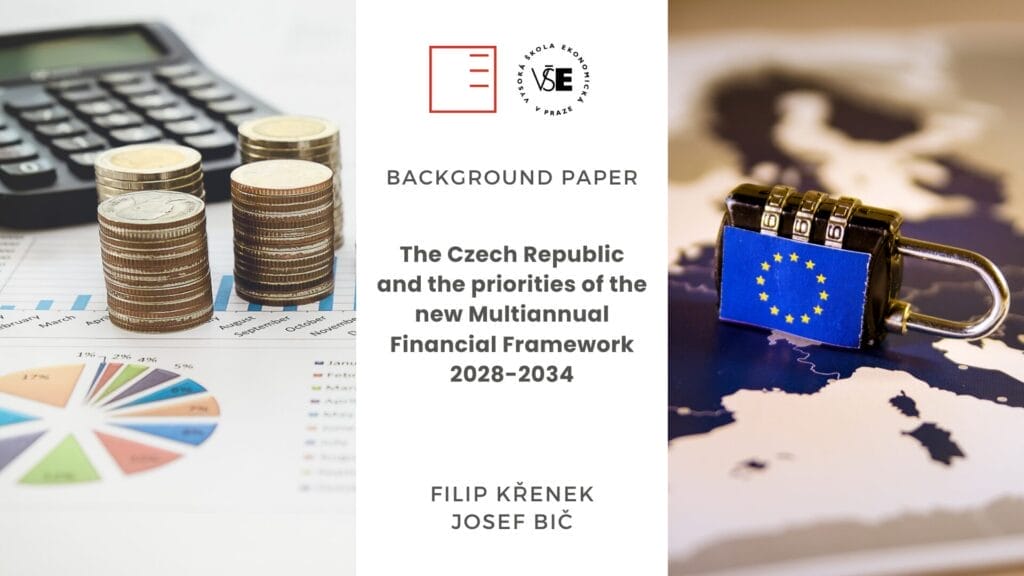
Background paper | The Czech Republic and the priorities of the new Multiannual Financial Framework 2028-2034
More info 28. 3. 2025
28. 3. 2025
The Multiannual Financial Framework (MFF) is the EU's key instrument for determining the expenditure and revenue components of the common European budget. The negotiations on the long-term budget are among the most important and lengthy at European level. It decides on overall spending in traditional areas such as agriculture and cohesion, but also on new priorities such as defence and competitiveness. The European Commission is expected to present its proposal for the 2028-2034 financial framework by mid-2025, but informal discussions on the shape of the proposal are already taking place at both working and political level - the new European Commissioner for Budgets is now touring Member States and the Commission has launched a public consultation on the subject.
The Commission has already presented the broad outlines of the next MFF, including a greater focus on efficiency, added value and simplification. It has also stressed the need for more flexibility to make the budget more responsive to crises. The number of (old) new priorities, including defence, climate and competitiveness, also raises the question of the size of the next European budget and new own resources. The current debate on the Czech priorities for the next MFF is therefore more than appropriate and the Czech Republic should actively enter into negotiations at the European level.
The background paper for the round table of the National Convention on the EU was prepared by Josef Bič (FSV VŠE) and Filip Křenek (EUROPEUM).
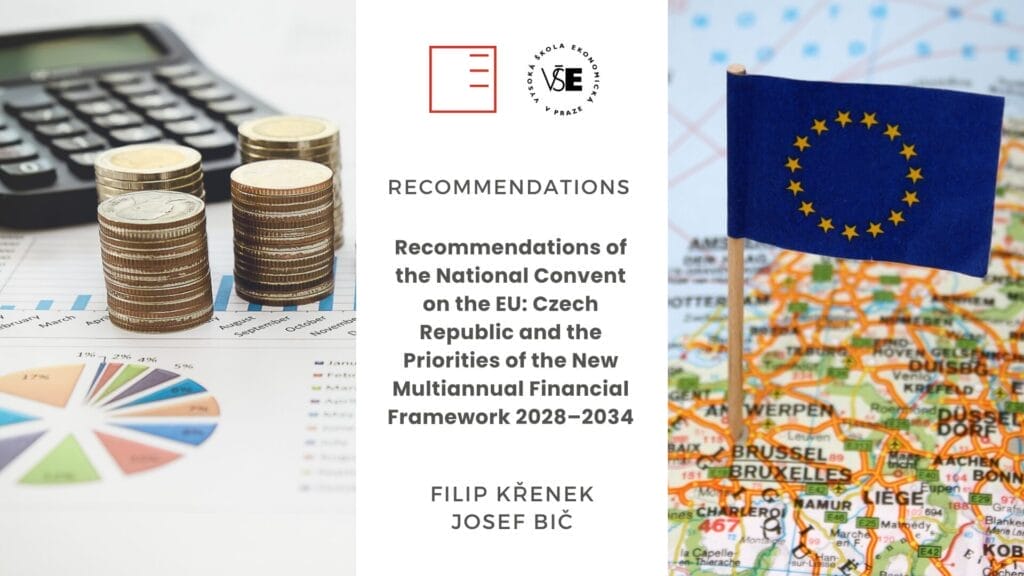
Recommendations of the National Convent on the EU: Czech Republic and the Priorities of the New Multiannual Financial Framework 2028–2034
More info 28. 3. 2025
28. 3. 2025
The National Convention on the European Union has published a new policy paper with recommendations on the topic Czechia and the Priorities of the New Multiannual Financial Framework 2028–2034. The document is based on the roundtable discussion held on 28 March 2025 and responds to current debates on the shape of the next EU budget in the context of increasing expenditure pressures — for example, in the areas of defence, the reconstruction of Ukraine, or competitiveness.
The recommendations focus on the need to clearly define Czech priorities, take new challenges into account, and strengthen the involvement of Czech stakeholders in European programmes. They also reflect the need to streamline budgetary instruments and emphasise the importance of broader public and expert debate on the benefits of the EU budget for the Czech Republic.
The expert guarantors of the roundtable were the Institute for European Policy EUROPEUM and the University of Economics in Prague.
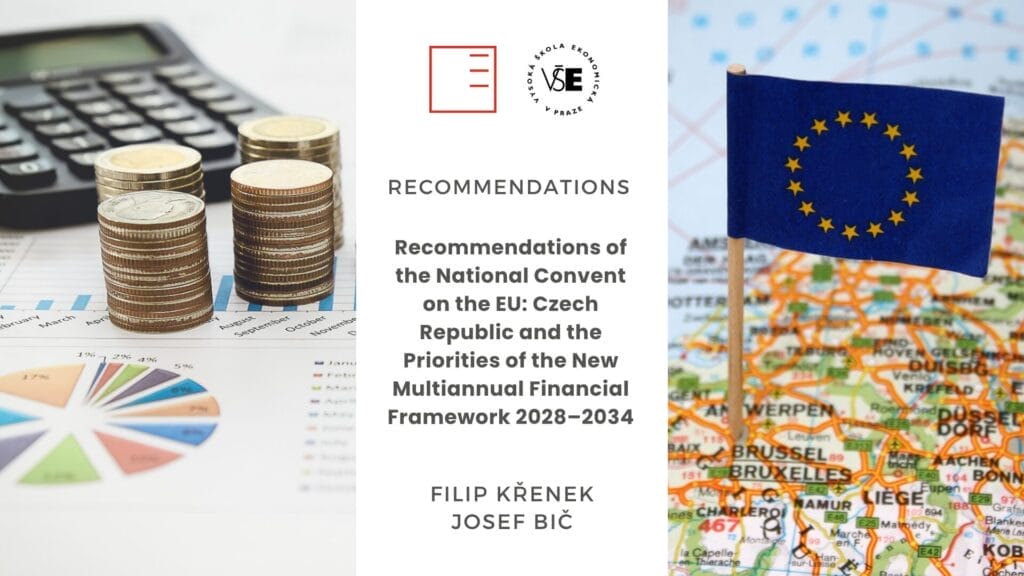
Recommendations of the National Convent on the EU: Czech Republic and the Priorities of the New Multiannual Financial Framework 2028–2034
More info 28. 3. 2025
28. 3. 2025
The National Convent on the European Union issued recommendations based on the roundtable held on 28 March 2025 on the topic "The Czech Republic and the Priorities of the New Multiannual Financial Framework 2028–2034."
The discussion focused on the priorities of the next EU multiannual budget, with emphasis on efficiency, added value, simplification, and the need to strengthen European defense spending.
The expert guarantors of the roundtable were the Institute for European Policy EUROPEUM and the University of Economics in Prague.

Policy Brief | How to pay for green transformation? Outlook for future EU financial instruments
More info 13. 12. 2024
13. 12. 2024
The shape of the next EU Multiannual Financial Framework (MFF) for the period 2028-2034 is the subject of one of the key debates facing the new EU institutions. Key questions include how much funding will be available to finance the green transformation of European economies. Indeed, there is a growing conviction that there is a lack of adequately set incentives and support for the existing climate targets and regulations adopted at EU level. In Polify Brief, EUROPEUM Institute analyst Filip Křenek and AMO analyst Tomáš Jungwirth Březovský write.

Policy Paper | Trade, money, power: A recipe for a green and competitive Europe?
More info 11. 11. 2024
11. 11. 2024
As Europe stands at a crossroads, it must navigate a complex landscape where economic competitiveness, energy security, and climate goals intersect. Historically a champion of open trade, the EU now faces mounting pressures from high energy costs, raw material dependencies, and competition in clean technologies. These challenges are compounded by the need to boost resilience amid rising geopolitical tensions and declining public support for climate policies. In this Policy paper EUROPEUM Institute analyst Filip Křenek explores how the EU can leverage trade policy, capital and energy markets to safeguard its global standing and foster a greener, more competitive future. Central European countries, like Czechia, play a crucial role in this effort, advocating for open markets while grappling with economic and energy dependencies and vulnerabilities.

Policy Paper | Circularity and life cycle of batteries and construction materials in the automotive industry as an opportunity for the Czech Republic
More info 31. 10. 2024
31. 10. 2024
Based on research reports in the field of batteries and construction materials, this policy paper summarises strategic steps and recommendations to support the development of the Czech battery industry and to strengthen the use of low-emission materials and circular strategies in the automotive industry. The policy paper by EUROPEUM Institute for European Policy in cooperation with the Institute for Circular Economy (INCIEN) and accompanying studies are a major contribution to the debate on the transformation of the automotive industry, which today faces challenges related to decarbonisation and increasing competition, especially from China.
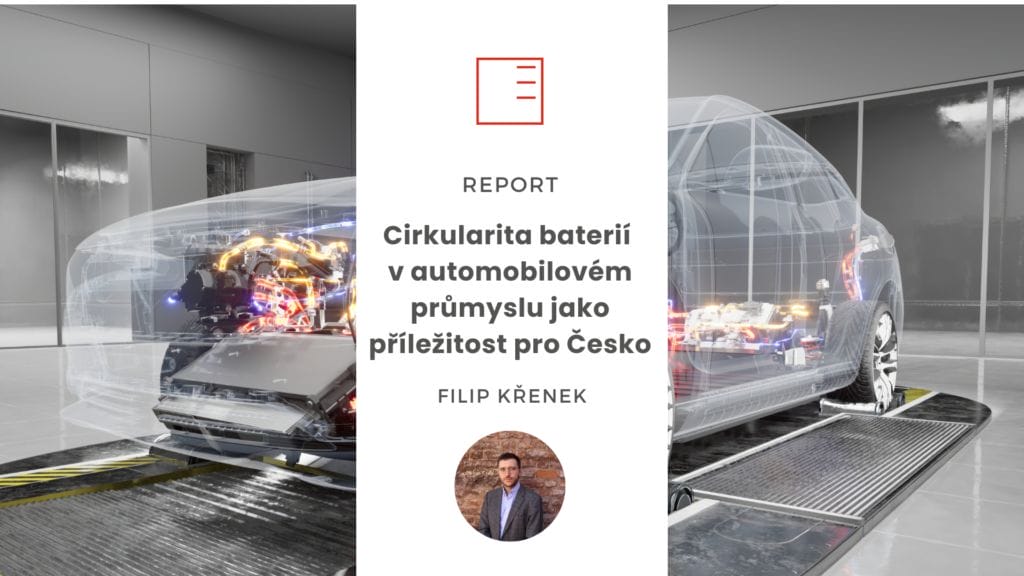
Report | Battery circularity in the automotive industry as an opportunity for the Czech Republic
More info 29. 10. 2024
29. 10. 2024
The report "Battery Circularity in the Automotive Industry as an Opportunity for the Czech Republic" addresses key issues in the development of the battery industry in the Czech Republic, with an emphasis on the circular economy, recycling and reuse of batteries. The study, which was produced in cooperation between EUROPEUM think tank and experts in the field of batteries and electromobility, shows that although the Czech market is still lagging behind in the development of battery production and recycling, its potential is huge - from raw material extraction to component production to battery recycling, which would significantly strengthen the resilience and environmental sustainability of the Czech economy.